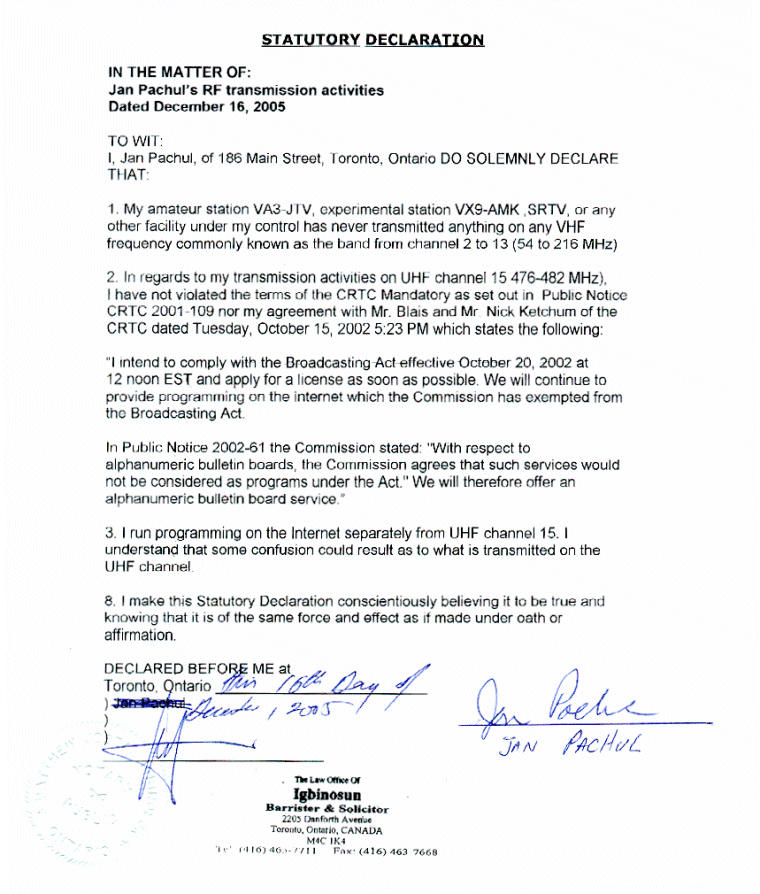

December 16, 2005
Marc O'Sullivan
CRTC Executive Director Broadcasting
Re: Letter dated December 9, 2005
Dear Mr. O'Sullivan :
1. Let me get this straight, you are responding to correspondence the CRTC received from me almost 11 months ago,- January 17, 2005. This would be funny if it wasn't so loathsome.
2. Please find attached a sworn copy of a Statutory Declaration (Exhibit A) made by me concerning my RF transmission activities. Please note that I have not violated the terms of the CRTC Mandatory Order as set out in Public Notice CRTC 2001-109 nor have I ever transmitted on any VHF channel including VHF channel 13.
3. I contend that the Complainant "Mason Baxley" is a fictitious person. "Mason Baxley" cannot be found in Canada by any Internet or phone directory search and he used a Hotmail anonymous email account to deliver his complaint for channel 13.
4. The CRTC's Fact Sheet: "How to file a Broadcasting Complaint," has the following statement under the heading "Anonymous Complaints:"
"The CRTC does not pursue anonymous complaints. You must provide your full name and an email or postal address where you can be contacted. Broadcasters, cable companies and other service providers have the right to know the allegations against them, the identity of the complainant and the right of reply."
5. This same document, under the heading "Complaints and Privacy," has the following statement: "To pursue a complaint, the CRTC requires your full name and an address where you can be contacted."
6. "Mason Baxley" is not only anonymous but is also fictitious. I demand that the CRTC immediately provide verifiable evidence that "Mason Baxley" is indeed a person residing in Canada and has filed the complaint in question. Failing this, I demand that the CRTC immediately withdraw this complaint.
7. Notwithstanding the status of the "Mason Baxley" complaint, Mr. Baxley appeared to be satisfied with my response to his complaint since he did not respond to my email. Why did the CRTC not let the complaint rest at this time?
8. In reference to the footnote, "The processing of this application has been put aside until such time as the Commission has disposed of the complaint," I have found no regulation that states an application and subsequent hearing can be delayed as a result of a complaint. Is this a "regulation" the CRTC has created to suit the purpose of defrauding me out of a licence?
9. Like a cheap con artist you neglected to include the definition of a "program" in your quoting a section of the Broadcasting Act. The definition of programming is as follows: "program" means sounds or visual images, or a combination of sounds and visual images, that are intended to inform, enlighten or entertain, but does not include visual images, whether or not combined with sounds, that consist predominantly of alphanumeric text;"
10. Predominantly is defined in the Merriam-Webster Online Dictionary as "for the most part: MAINLY"
11. Screen Saver is defined in the Merriam-Webster Online Dictionary as: "a computer program that usually displays various images on the screen of a computer that is on but not in use so as to prevent damage to the screen's phosphors."
12. In addition the CRTC made the following statements in Broadcasting Public Notice CRTC 2002-61, Policy framework for community-based media:
13. Under the heading Local community television programming:
"25. In addition, the Federation and the MCCQ requested that alphanumeric bulletin boards be excluded from the definition of local community programming as they are not considered programs, as defined in the Act."
14. Under the heading The Commission's analysis and determination:
"30. With respect to alphanumeric bulletin boards, the Commission agrees that such services would not be considered as programs under the Act... the Commission recognizes that, for smaller cable systems, these bulletin boards can provide a useful and cost-effective means of serving the community and permitting community groups to promote their activities."
15. The so-called evidence tape contains text messages and a screen saver. The music background is composed of a wide selection of Toronto artists.
16. This on-air presentation is not different than the material transmitted during the last three years since my October 15, 2002 agreement with the CRTC. (Exhibit B.) If the CRTC wants to deny that an agreement is in place then why did it take three years for this matter to surface?
17. From the above it is clear that the CRTC does not consider alphanumeric bulletin boards "Broadcasting." A Screen saver cannot be considered "Broadcasting" since it has a technical function of preventing damage to the television screen's phosphors. A screen saver therefore is not intended to "inform, enlighten or entertain."
18. The CRTC has violated my privacy rights by using information gathered during a request for assistance regarding an unrelated complaint. (Name withheld) approached me for assistance in investigating a complaint by the FCC for interference on VHF channel 13, not "Mr. Baxley's" complaint. This request for assistance was in no way related to my station application. At no time was I notified that I was the target of Industry Canada's investigation. (Name withheld) says he was not aware that he was being used by the CRTC in this manner. I will shortly file a complaint with the Privacy Commissioner.
Conclusion:
19. All the points in this letter should be moot because I should already have a licence. If the CRTC wasn't engaged in this criminal conspiracy to defraud me of a licence, I should have had a June hearing in Niagara Falls and a licence award the same time you sent me this bogus letter. I will be frank, I consider the behavior contained in this letter to be criminal, fraudulent behavior. The CRTC is not immune to the laws of Canada.
20. The CRTC has manufactured a complaint using a fictitious person,
took almost one year to answer correspondence, invented a regulation to
conveniently delay my application a year, violated my privacy rights, denied
me due process, in total prevented me from becoming a legitimate
broadcaster since 1997. We will see if a Crown Attorney doesn't agree with
me that this is fraud. By the way,
"FUCK YOU!"
Sincerely,
Jan Pachul
The following is a Exhibit A:

The following is a Exhibit B:
From: "Star Ray TV" srtv@srtv.ca
To: "Blais, Jean-Pierre" jean-pierre.blais@crtc.gc.ca
Subject: Re: Your email of 10 October 2002
Date: Tuesday, October 15, 2002 5:15 PM
Dear Mr. Blais,
I am pleased that the Commission has finally released the low power television policy and is willing to accept an application from us.
I intend to comply with the Broadcasting Act effective October 20, 2002 at 12 noon EST and apply for a license as soon as possible. We will continue to provide programming on the internet which the Commission has exempted from the Broadcasting Act.
In Public Notice 2002-61 the Commission stated: "With respect to alphanumeric bulletin boards, the Commission agrees that such services would not be considered as programs under the Act." We will therefore offer an alphanumeric bulletin board service.
Sincerely,
Jan Pachul
Star Ray TV
----- Original Message -----
From: "Blais, Jean-Pierre" jean-pierre.blais@crtc.gc.ca
To: "Jan Pachul (E-mail)" srtv@srtv.ca
Cc: "Cutler, Jeanne" jeanne.cutler@crtc.gc.ca; "Howard, William"
william.howard@crtc.gc.ca; "Ketchum, Nick" nick.ketchum@crtc.gc.ca
Sent: Tuesday, October 15, 2002 11:58 AM
Subject: Your email of 10 October 2002
Dear Mr. Pachul:
My responses to the questions you asked in your e-mail dated 10 October 2002 are as follows:
1. The Commission released its policy framework for community media, including a new licensing policy for community-based television programming undertakings, at 2:00 p.m. Ottawa time, on 10 October 2002. You can access this policy (Public Notice CRTC 2002-61) on our web site.
2. See above.
3. The Commission will accept applications at any time. However, a unique application form is being prepared for community-based television programming undertakings and should be available on our web site shortly.
I recommend that potential applicants wait until this form is available before filing an application in order to avoid unnecessary deficiency questions.
4. The Commission will consider all applications on their merits. In examining applications, the Commission may take into considerations all relevant facts with respect to the applicant.
5. The Commission does not consider that there is evidence of any bias in its dealings with you. We note that the Courts have agreed with this position.
6. See Public Notice CRTC 2002-62 as well as the Commission's record in licensing new commercial and community players in radio markets across the country.
Please inform the Commission as to whether you intend to continue broadcasting without a licence.
Yours truly,
Jean-Pierre Blais
Executive Director,
Broadcasting
Canadian Radio-television and Telecommunications Commission
__________________________________________________________________
STAR RAY TV
186 Main Street
Toronto, Ontario M4E 1W2
416.693.7400
www.srtv.ca srtv@srtv.ca
10 October 2002
Mr. Jean-Pierre Blais
Executive Director Broadcasting
CRTC
Ottawa, Ontario
Dear Mr. Blais: This is in reference to your letter dated October 7, 2002 in which you requested a reply in writing by Friday October 11, 2002. I apologize for the delay in responding to you. I am disappointed that you consider a telephone conversation with me to be inappropriate. I therefore am submitting my questions in writing.
Please respond to the following questions:
1. How can the CRTC regulate low power broadcasting without a policy in place?
2. When approximately will a low power policy be released?
3. When will the CRTC accept an application from me?
4. What are the chances of me getting a licence?
5. How are the issues that I have regarding the "reasonable apprehension of bias" of the CRTC has against me being addressed?
6.What steps has the CRTC taken to include new entrants in Canada's broadcasting system?
Your prompt reply is appreciated.
Sincerely,
Jan Pachul
*** END OF DOCUMENT ***